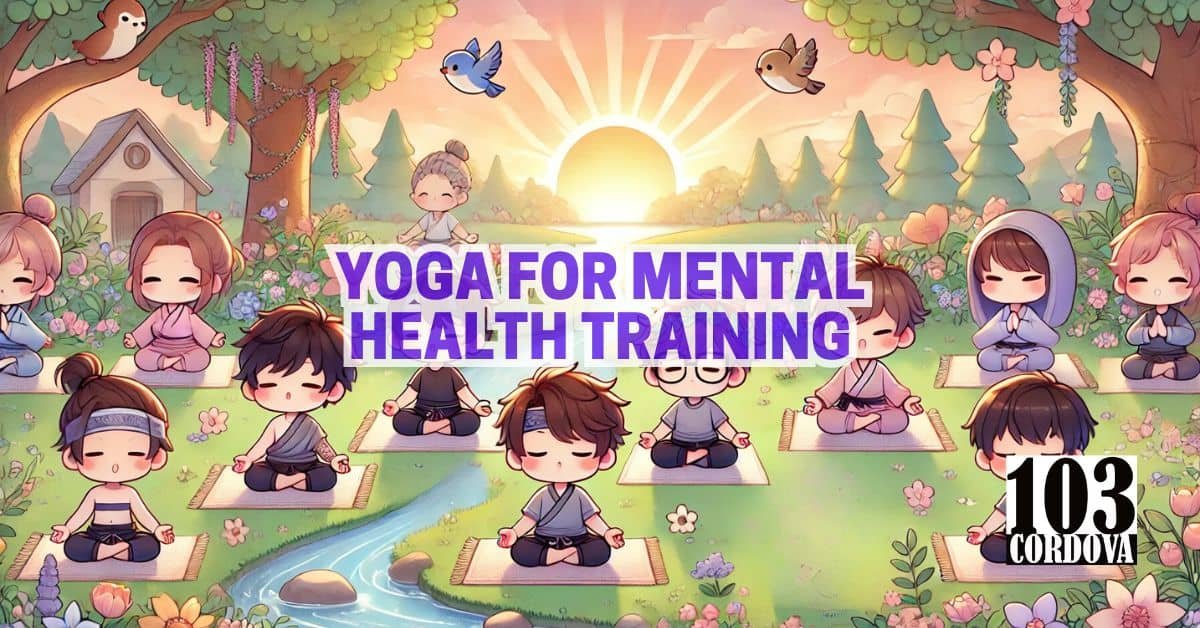Yoga is an ancient practice that is now used by many to help manage mental health issues.
Yoga for Mental Health Training focuses on reducing stress and anxiety while enhancing emotional well-being.
By using specific techniques, such as breathwork, poses, and meditation, yoga provides a range of benefits to improve mental health.
These practices are designed to calm both the body and mind, helping people feel more centered and less overwhelmed by their daily challenges.
Understanding how yoga impacts mental health can offer individuals effective tools for reducing stress and finding balance in life.
1. How Yoga Helps Improve Mental Health and Manage Stress
Yoga brings the mind and body into balance, which is essential for improving overall mental health.
By focusing on movement, breathing, and staying present, yoga helps to reduce the effects of stress.
Practicing yoga regularly can uplift mood, increase focus, and promote a sense of calm.
It also helps individuals develop a more positive outlook by releasing physical tension and encouraging a relaxed state of mind.
Yoga fosters self-awareness, allowing people to recognize stress triggers and respond to them more constructively.
🧘 Exploring the Health Benefits of Infrared Hot Yoga: What You Should Know
2. Breathing Techniques in Yoga to Relieve Stress and Anxiety
Breathing exercises are a vital part of yoga for mental health training.
Practices like deep breathing and alternate nostril breathing can help relax the nervous system.
These techniques regulate the body’s stress response, making it easier to manage anxiety.
Controlled breathing reduces heart rate and lowers blood pressure, leading to a calmer state of mind.
Incorporating breathing exercises into daily life can create moments of tranquility and make stressful situations more manageable.
🧘 Maximizing the Benefits of Hip-Opening Yoga: Tips and Techniques for Beginners
3. Effective Yoga Poses for Reducing Stress and Tension
Certain yoga poses, such as Child’s Pose and Legs Up the Wall, are great for releasing tension.
These poses are gentle and calming, helping to relax tight muscles and reduce stress.
Including these poses in your yoga routine can make a significant difference in managing anxiety levels.
Forward folds and restorative poses help activate the relaxation response, signaling the body that it is safe to rest.
Practicing these poses regularly can create a sense of comfort and improve both physical and emotional well-being.
🧘 The Transformative Benefits of Postnatal Yoga for New Mothers
4. The Role of Meditation in Yoga for Managing Anxiety
Meditation is a central component of yoga that helps calm an overactive mind.
Yoga for Mental Health Training often includes meditation to promote relaxation and reduce anxious thoughts.
By practicing even a few minutes of meditation daily, people can learn to manage their anxiety more effectively.
Meditation brings attention to the present moment, preventing worries about the future from taking over.
This practice encourages mindfulness, which helps individuals gain better control over their emotional responses to stress.
🧘 The Life-Changing Impact of Yoga Teacher Training: Why You Should Consider Enrolling
5. Yoga for Emotional Regulation: Managing Stress Effectively
Yoga can help individuals regulate their emotions more effectively, making it easier to handle stress.
By focusing on slow, mindful movements, yoga teaches you to be aware of your emotions and stay in control.
This awareness allows you to respond to stress in a healthy way instead of letting it take over.
Emotional regulation is key to managing challenging situations, and yoga provides a space to process emotions without judgment.
Regular practice fosters a better understanding of emotional patterns and offers healthier ways of responding to them.
🧘 How Yoga Classes for 11-Year-Olds Benefit Their Mental and Physical Health
6. How Yoga Lowers Cortisol Levels and Reduces Stress
High cortisol levels, the hormone linked to stress, can affect both mental and physical health.
Yoga for Mental Health Training helps reduce cortisol through gentle movement, deep breathing, and relaxation.
This process keeps both the body and mind in a healthier state, making stress easier to manage.
Lowering cortisol levels through yoga can improve immune function, stabilize blood sugar, and reduce the risk of stress-related conditions.
Practicing yoga consistently helps maintain a calmer physiological state, reducing the overall impact of stress on the body.
🧘 Integrating Yoga and Exercise: How to Develop a Complementary Fitness Plan
7. Improving Sleep Quality with Yoga for Stress Relief
Getting enough sleep is crucial for managing anxiety and stress.
Yoga can help improve sleep quality by calming the mind before bedtime.
Restorative poses and breathing techniques prepare the body for rest, helping people fall asleep faster and wake up feeling more refreshed.
Relaxing yoga sequences, such as gentle twists and stretches, release physical tension and quiet the mind, which is essential for better sleep.
Improved sleep quality leads to greater resilience against stress and contributes to overall mental well-being.
🧘 Is Yoga Teacher Training Valuable If You Do Not Plan to Teach?
8. The Mind-Body Connection in Yoga and Its Impact on Anxiety
Yoga helps strengthen the mind-body connection, which plays an important role in managing anxiety.
By paying attention to how the body feels during each movement, you can develop greater awareness of how your body responds to stress.
This awareness helps in managing anxiety by recognizing the signs early and practicing calming techniques.
Strengthening the mind-body connection also allows better control over physical reactions, such as rapid heartbeat or muscle tightness.
The more attuned you are to your body’s signals, the better you can respond with mindful actions that reduce anxiety.
🧘 The Difference Between “Do Yoga” and “Practice Yoga”: Understanding the Variations in Terminology
9. Building Mental Resilience Through Regular Yoga Practice
Regular yoga practice helps build mental resilience, meaning the ability to handle challenges more effectively.
Yoga encourages focus, patience, and self-acceptance—all qualities that contribute to resilience.
With increased resilience, everyday stressors and anxieties become easier to manage.
It also allows individuals to approach difficult situations with a calmer mindset, reducing the likelihood of becoming overwhelmed.
Building resilience through yoga means facing life’s challenges with strength and a positive attitude rather than reacting with fear or frustration.
10. The Benefits of Group Yoga Classes for Managing Social Anxiety
For people struggling with social anxiety, group yoga classes can be a supportive environment.
Practicing yoga in a group helps build social connections and reduces feelings of loneliness.
The shared experience of yoga in a non-judgmental space can make it easier to feel comfortable around others.
Group classes offer a sense of belonging and provide opportunities for positive interactions, which can help reduce social fears over time.
Being part of a group practice encourages mutual support and fosters a community where everyone works on their well-being together.
🧘 103 Cordova Yoga Studio in Marikina City
💡 Conclusion
Yoga for Mental Health Training offers a variety of tools for managing stress and anxiety.
From breathing exercises to yoga poses and meditation, there are many ways yoga can improve mental well-being.
Regular practice can lead to better emotional health, lower stress levels, and a more positive outlook on life.
Yoga not only provides relief from immediate stress but also builds a foundation for long-term mental stability.
Committing to a yoga practice can help anyone find balance and peace amid the challenges of everyday life.
🧘 Our Services
Discover the transformative power of yoga at our studio, located at 103 Cordova Tower, Marquinton Residences, Cirma Street, Sto. Niño, Marikina City.
We offer yoga classes tailored to all ages and skill levels, ensuring a welcoming space for beginners and seasoned practitioners alike.
Enhance your physical strength, flexibility, and inner peace in our serene and supportive environment.
Reach out to us through Facebook, our website’s contact form, or call us at 09176225780 to begin your journey toward wellness.
Join us today and experience how yoga can harmonize your mind, body, and spirit!

